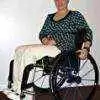-
Welcome to Celiac.com!
You have found your celiac tribe! Join us and ask questions in our forum, share your story, and connect with others.
-
Celiac.com Sponsor (A1):
Celiac.com Sponsor (A1-M):
-
Get Celiac.com Updates:Support Our Content
Celiac Disease, Gluten Ataxia And Candidiasis / Yeast Overgrowth - A Must Read!
-
Get Celiac.com Updates:Support Celiac.com:
-
Celiac.com Sponsor (A17):
Celiac.com Sponsor (A17):
Celiac.com Sponsors (A17-M):
-
Recent Activity
-
- Haugeabs replied to Jane02's topic in Gluten-Free Foods, Products, Shopping & Medications23
Desperately need a vitamin D supplement. I've reacted to most brands I've tried.
For my Vit D3 deficiency it was recommended to take with Vit K2 (MK7) with the Vit D. The Vit K2 helps absorption of Vit D3. Fat also helps with absorption. I take Micro Ingredients Vit D3 5000 IU with Vit K2 100 micrograms (as menaquinone:MK-7). Comes in soft gels with coconut oil. Gluten free but not certified gluten free. Soy free, GMO free. -
- trents replied to xxnonamexx's topic in Gluten-Free Foods, Products, Shopping & Medications7
FDA looking for input on Celiac Gluten sensitivity labeling PLEASE READ and submit your suggestions
@Known1, I submitted the following comment along with my contact information: "I have noticed that many food companies voluntarily include information in their ingredient/allergen label section when the product is made in an environment where cross contamination with any of the nine major allergens recognized by the FDA may also be likely. Even... -
- Wheatwacked replied to Heatherisle's topic in Celiac Disease Pre-Diagnosis, Testing & Symptoms34
Blood results
Celiac Disease causes more vitamin D deficiency than the general population because of limited UV sunlight in the winter and the little available from food is not absorbed well in the damaged small intestine. Taking 10,000 IU a day (250 mcg) a day broke my depression. Taking it for eleven years. Doctor recently said to not stop. My 25(OH)D is around 2... -
- Known1 replied to xxnonamexx's topic in Gluten-Free Foods, Products, Shopping & Medications7
FDA looking for input on Celiac Gluten sensitivity labeling PLEASE READ and submit your suggestions
Thank you for sharing your thoughts. I respectfully disagree. You cherry picked a small section from the page. I will do the same below: The agency is seeking information on adverse reactions due to “ingredients of interest” (i.e., non-wheat gluten containing grains (GCGs) which are rye and barley, and oats due to cross-contact with GCGs) and on ...
-




Recommended Posts
Archived
This topic is now archived and is closed to further replies.